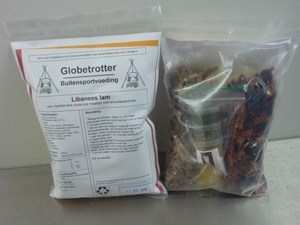TL;DR: Meat, no. Non-meat, Yes.
In practice, it's close to impossible to legally import meat in any form into Japan, because you need to get an inspection certificate for it:
No meat products can be brought into Japan without the inspection
certificate.
This requirements applies to any import irrespective of the use or
quantity: it should be noted that import of such products for
souvenir, personal consumption or commercial sample, no matter how
small the quantity is, needs to obtain an inspection certificate
issued by the government authority.
There certificates are sometimes available at duty-free shops for beef jerky etc, but obviously your trekking meals won't have this. What's more, personal imports of beef and beef products from countries that have or have ever had BSE (mad cow disease), which includes basically all of Europe, is completely banned:
Regarding beef or beef offal exported from Canada, U.S.A., France, The
Netherlands or Ireland to Japan, only these commodities treated in
accordance with the animal health requirements ... including specific
export programs and designation of facilities, are acceptable.
Furthermore, it is to be noted that beef products (e.g. ham, sausage,
beef jerky) have not been allowed to be imported.
So that's the legal theory. In practice, Customs is much more interested in drugs, large amounts of alcohol etc. If they do spot that you've got meat, it will be confiscated and destroyed, but I've never heard of anybody being fined or worse.
Non-meat foods, on the other hand, despite what the regulations may say, are totally OK in practice. Eggs and milk that are obviously processed are not a problem at all, I (and every single Japanese tourist ever) bring in baked goods every time I visit (curse you, omiyage!) and I have never had a problem. Fresh food (fruits etc) has some restrictions, but they're not relevant to you.
All that said, bringing food all the way from Europe seems a bit pointless, trekking is extremely popular in Japan and any camping goods store will have a huge selection of portable "just-add-water" foods. Here are the selections at two random online shops: Sports Authority, Kojitsu Sanso.

